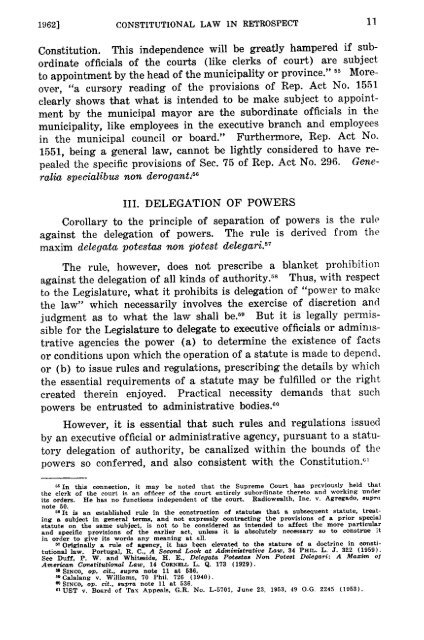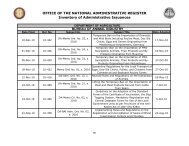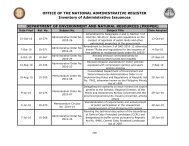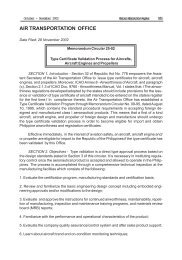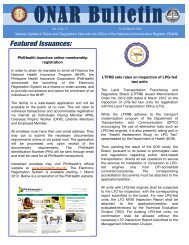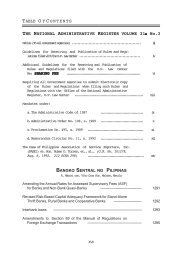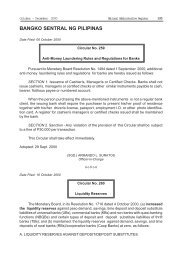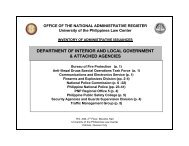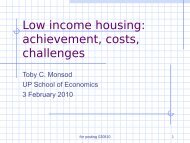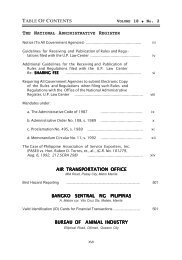PLJ volume 37 number 1 -01- Deogracias Eufemio
PLJ volume 37 number 1 -01- Deogracias Eufemio
PLJ volume 37 number 1 -01- Deogracias Eufemio
Create successful ePaper yourself
Turn your PDF publications into a flip-book with our unique Google optimized e-Paper software.
Constitution. This independence will be greatly hampered if subordinate<br />
officials of the courts (like clerks of court) are subject<br />
to appointment by the head of the municipality or province." 55 Moreover,<br />
"a cursory reading of the provisions of Rep. Act No. 1551<br />
clearly shows that what is intended to be make subject to appointment<br />
by the municipal mayor are the subordinate officials in the<br />
municipality, like employees in the executive branch and employees<br />
in the municipal council or board." Furthermore, Rep. Act No.<br />
1551, being a general law, cannot be lightly considered to have repealed<br />
the specific provisions of Sec. 75 of Rep. Act No. 296. Genera.lia<br />
specialibus non derogant: 56<br />
Corollary to the principle of separation of powers is the rule<br />
against the delegation of powers. The rule is derived from the<br />
maxim delegata potestas non potest delegari. 57<br />
The rule, however, does not prescribe a blanket prohibition<br />
against the delegation of all kinds of authority. 58 Thus, with respect<br />
to the Legislature, what it prohibits is delegation of "power to make<br />
the law" which necessarily involves the exercise of discretion and<br />
judgment as to what the law shall be. oll But it is legally permissible<br />
for the Legislature to delegate to executive officials or admimstrative<br />
agencies the power (a) to determine the existence of facts<br />
or conditions upon which the operation of a statute is made to depend,<br />
or (b) to issue rules and regulations., prescribing the details by which<br />
the essential requirements of a statute may be fulfilled or the right<br />
created therein enjoyed. Practical necessity demands that such<br />
powers be entrusted to administrative bodies. 60<br />
However, it is essential that such rules and regulations issued<br />
by an executive official or administrative agency, pursuant to a statu··<br />
tory delegation of authority, be canalized within the bounds of the<br />
powers so conferred, and also consistent with the Constitution. c1<br />
'" In this connection. it may be noted that the Supreme Court has pr£viously held that<br />
the clerk of the court is an officer of the court entirely subordinate thereto and working under<br />
its orders. He has no functions indePendent of the court. Radiowealth, Inc. v. Agregado, supra<br />
note 50.<br />
•• It is an established rule in the construction of statutes that a subsequent statute, treating<br />
a subject in general terms, and not expressly contracting the provisions of a prior special<br />
statute on the same subject, is not to be considered as intended to affect the more particular<br />
and specific provisions of the earlier act, unless it is absolutely necessary so to construe it<br />
in order to give its words any meaning at nIl.<br />
'" Originally a rule of agency. it has been elevated to the stature of a doctrine in constitutional<br />
law. Portugal, R. C., A S""mzd Look at Administrative Law, 34 PHIL. L. J. 322 (1959).<br />
See Duff, P. W. and Whiteside, H. E.• Delegata Poteatas Non Patest DelegaTi: A Ma.,im at<br />
American CotletitutitnUil Law, 14 CORNElLL. Q. 173 (1929).<br />
os SINCO. p. cit., supra note 11 at 536.<br />
'" Calalang v. Williams. 70 Phil. 726 (1940) .<br />
.., SINCO,ap. cit., supra note 11 at 536.<br />
., UST v. Board of Tax Appeals, G.R. No. L-57<strong>01</strong>, June 23. 1953, 49 O.G. 2245 (1953).


